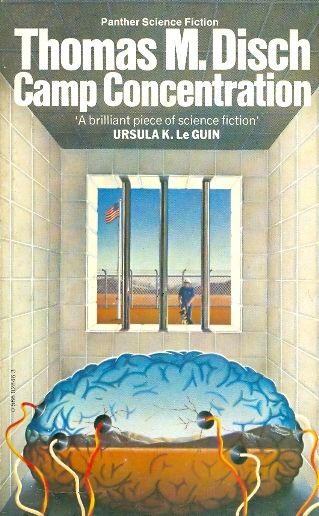
Camp Concentration
Thomas M. Disch
325 pages
published in 1968
Camp Concentration is a classic New Wave science fiction novel, but one I’ve never read before. I’ve always been a bit scared of Disch, due to his reputation as a “difficult” and pessimistic writer. These are qualities I’ve only recently started to appreciate, together with a renewed interest in New Wave science fiction. The New Wave was a time when science fiction went through a real literary revolution, as a new generation of writers started to question the genre’s core assumptions, first in the UK and then in America, where the New Wave went into a more political direction. Camp Concentration embodies this revolution perfectly.
It’s central idea, of political prisoners injected with a specially altered syphilis virus to make them hyperintelligent in order that they can design new superweapons for the American military, completely subverts science fiction’s traditional belief in technological progress. What’s more, any kind of dark thrill that could be had from this scenario is quickly undermined as well, as we never see the any sign of anything like that going on at all. Instead we get alchemy.
Louis Sachetti is a “concie”, a conscentious objector at a time when the US is again involved in some sort of Vietnam war, under the presidency of Robert McNamara. There’s talk about “biological warfare against so-called neutral countries” and the political climate is worse and even more conformist than it was than in real life. He’s serving a five year sentence for refusing to be drafted, when he’s taken out of prison and is transferred against his will to Camp Archidemes. Run by general Haast, this is supposed to be a research facility for superweapons; instead the intelligence augmented but shortlived prisoners have become obsessed with alchemy and taken Haast with him, as they’re looking for a way to extent their lives using alchemy. Meanwhile the camp turns out to be paradise for Sachetti compared to prison as one of the best libraries in the world is at his command, he gets three haute cuisine meals a day, his room is his own to decorate and he’s free to work on his poetry in peace. He keeps a diary and the story is told through this.
Paradise turns to Hell when Sachetti realises he is already infected, an involuntary Faust having made a bargain with a microscopic Mephistoles, a point foreshadowed by the established prisoners’ staging of Marlowe’s Doctor Faustus shortly after he first arrived at the camp. His writings become feverish yet still erudite. And then the real Faust arrives, Skilliman, who learned of the project and volunteered to be injected; worse convinced others to do so. The remainder of Camp Concentration is the struggle between these two Fausts, the voluntary and involuntary one. Again though, this struggle is undercut by the ending, as it’s revealed that what Sachetti thought was happening was as much theatre as that reenactment of Faustus. The question for the reader remains how much to trust these final revelations in a novel that’s done its best to make you mistrust it…
Camp Concentration is a novel dense with meaning, deceptively easy to read and seemingly understand. The way Disch wrote it put me in mind of Kurt Vonnegut, as both share a ability to remain down to earth and matter of fact while writing of the absurd and both write science fiction without the sense of wonder filter that almost all other science fiction consciously or unconsciously is written with, including by most New Wave authors. Disch isn’t impressed with his idea of an intelligence amplifying syphilis virus, which others would’ve been.
The voice he gives to Louis Sanchetti is one of a lettered and well cultured man, which is why his diary entries are full with literary and other allusions, some obscure, some not. It is one way in which Disch can show his increased intelligence, as it becomes more lucid yet hallucinatory as the virus takes hold. His attitude is best summed up in the following quote:
Someday in our colleges Himmler will be studied. The last of the great chiliasts. The landscapes of his interior world will elicit only an agreeable amount of terror. (Of Beauty, therefore.) Consider that the transcripts of the atrocity trials are already, these many years, offered for our entertainment in theaters. Beauty is nothing but the beginning…
I think it’s wrong to call this cynicism or pessimism, or even a certain world weariness; it’s more than that. The passage comes from the heart of the novel, written by Sanchetti at the depth of his adjustment to the virus. Perhaps you could say it and the passages that surround it make the case for the universal Faust, that we are all seduced by the evil inside of us, as long as that evil is sufficiently contained, compartmentalised, as long as we’re not responsible for making that choice, like Sanchetti wasn’t responsible for his own bargain?
Camp Concentration is a novel you do not have to agree with to find interesting. But you do have to open yourself up to it, allow yourself to be seduced by it… If not, it will very likely annoy you.
Camp Concentration – Thomas M. Disch | Wis[s]e Words
June 14, 2010 at 10:12 am[…] Read more… […]